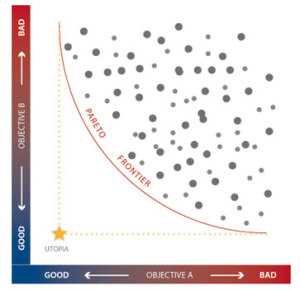 Christophe Labreuche (Thales)
Christophe Labreuche (Thales)
Multi-Criteria Decision Aid (MCDA) aims at helping an individual to make choices among alternatives described by several criteria. Criteria are usually conflicting in the sense that it is not possible to maximize all of them simultaneously. A multi-criteria approach is classically decomposed into the following parts:
(1) Structuring phase and choice of the decision model. The aim is to identify the relevant criteria and attributes, and then select a decision model.
(2) Elicitation of the decision model, and then Generation of the best option. In a constraint approach, from a set of learning data (representing for instance comparisons of alternatives), one then looks for the value of the model parameters compatible with the learning data, which maximizes some functional, e.g. an entropy or a separation variable on the learning data. The comparisons among alternatives are then obtained by applying the model with the previously constructed parameters. As the set of model parameters are usually not uniquely set from the learning data, one can try to handle such imprecision in a more cautious way. One can cite the use of robust preference relations or min-regret approaches.
(3) Explanation of the results. A trend in Artificial Intelligence and other domains is that decision support is not a black box but rather should explain its recommendation. The difficulty is to explain the result of decision models that are more and more elaborate. We will review the most well-known approaches in these three steps.
 Roberto Sacile (University of Genova)
Roberto Sacile (University of Genova)
In path finding algorithms from a source to a destination, shortest path algorithms are widely known and currently used in common advance driver assistance systems. However, in some specific applications such as dangerous goods transport, the minimization of the typical objective related to the travel cost (e.g. distance, time etc…) has to find a trade-off with another objective, which is the minimization of the risk and the exposure of the population to such risk. This multi-objective problem, which may be driven by a risk averse behaviour, has also important relationships with some behaviours which can be found in simple living beings surviving to risk in nature, sometimes also known as “playing against nature” problems. Some basic theory and practical examples will be shown.
 Simona Sacone (University of Genova)
Simona Sacone (University of Genova)
The most widely used modelling approaches for freeway traffic networks will be described together with the existing schemes for regulating the dynamic behaviour of traffic in the considered transportation systems. Attention will be focused on applied methods and real case studies as well as on the most advanced and innovative research approaches.
 Abderrahmane Habbal (INRIA)
Abderrahmane Habbal (INRIA)
When solving multi-optimization problems (multi -criteria, -point or -disciplinary ones), the first challenge is to set the relevant definition of what is to be computed. We shall discuss pros and cons of three approaches, scalarization, Pareto Front capture and Game formulations. The last one is quite new, and opens promising perspectives of handling complex concurrent design in engineering. The lecture will introduce all necessary theoretical material, and present some industrial applications.

 Xavier Gandibleux
Xavier Gandibleux